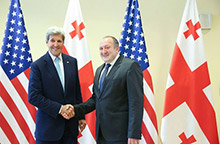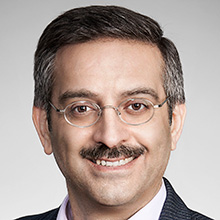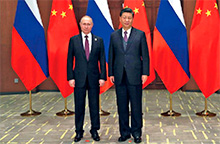
Nagorno-Karabakh Becomes Russia's Latest Protectorate in the South Caucasus  By Benyamin Poghosyan, PhD, Chairman, Center for Political and Economic Strategic Studies
By Benyamin Poghosyan, PhD, Chairman, Center for Political and Economic Strategic Studies
Azerbaijan, Turkey, and Russia all gained something as a result of the second Karabakh war, while Armenia and Nagorno-Karabakh lost almost everything.
The second Karabakh war ended with catastrophic results for Armenia and the Nagorno-Karabakh Republic. The trilateral statement signed by Russian, Armenian, and Azerbaijani leaders on November 10 was a clear capitulation of the Armenian sides. During the 26 long years of negotiations under the auspices of the OSCE Minsk Group, several settlement plans have been elaborated and offered to the conflict sides […]. However, none of them were as disastrous for Armenia and the Nagorno-Karabakh Republic as the trilateral statement of November 10, 2020. READ MORE
- EGF Editor |
Published on EGF: 26.11.2020
| External Relations
-
United States-Georgia Charter on Strategic Partnership: Defence and Security  By Eugene Kogan, Tbilisi-based defence and security expert
By Eugene Kogan, Tbilisi-based defence and security expert
Established in 2009, the United States-Georgia Charter on Strategic Partnership is based on four core pillars: Defense and Security Cooperation; Economic, Trade and Energy Cooperation; Strengthening Democracy; and Increasing People-to-People and Cultural Exchanges. As part of these two countries’ defence and security cooperation, the US provides financial support to the Georgian military, support for Georgia’s territorial defence and sovereignty, and, ultimately, for Georgia’s procurement of US defensive weapons. READ MORE
- EGF Editor |
Published on EGF: 25.11.2020
| External Relations
-
After the Elections, Georgia Needs to Walk Carefully on a Regional Tight Rope  By Benyamin Poghosyan, PhD, Chairman, Center for Political and Economic Strategic Studies
By Benyamin Poghosyan, PhD, Chairman, Center for Political and Economic Strategic Studies
On October 31, 2020, Parliamentary elections took place in Georgia. Since 2012 Georgian politics is often perceived as a two-men show - billionaire Bidzina Ivanishvili and former President Mikhail Saakashvili. In 2012, Mr. Ivanishvili made a surprisingly successful bid to win Parliamentary elections and ousted President Saakashvili's United National Movement (UNM) party from power. Saakashvili left Georgia in 2013 after the end of his second Presidential term and entered Ukrainian politics becoming the governor of the Odesa region. […] Meanwhile, several criminal investigations were opened against him in Georgia, and a court sentenced him in absentia to several years of imprisonment. Mr. Ivanishvili left the Prime Minister's position in late 2013, but continued to de facto govern Georgia through the ruling Georgian Dream (GD) party. READ MORE
- EGF Editor |
Published on EGF: 10.11.2020
| External Relations
-
China, Russia and the EU: Forging a Cooperative Relationship  By Elkhan Nuriyev, PhD, Eastern Europe-Global Area (EEGA) fellow at Leipzig University
By Elkhan Nuriyev, PhD, Eastern Europe-Global Area (EEGA) fellow at Leipzig University
For Russia, China’s Belt and Road Initiative is less of a threat than an opportunity. Moscow is receptive to the BRI’s ability to help create a multipolar world as it bolsters China’s global stance to counterbalance American hegemony. The Kremlin also views the BRI as a means to attract Chinese investment and foster renewed Russian influence over the European Union’s eastern zone. One of the important buckles of the Silk Road Economic Belt – the overland component of China’s ambitious Belt and Road Initiative (BRI) – is the Eastern Partnership (EaP) region, which represents an essential link between Asia and Europe. Developing this stage means enhancing commercial relations with six partner countries and an infusion of investment funds in several emerging-market economies. READ MORE
- EGF Editor |
Published on EGF: 23.09.2020
| External Relations
-
Iran–Turkey Rivalry in the Middle East: The Case of Lebanon  By Benyamin Poghosyan, PhD, Chairman, Center for Political and Economic Strategic Studies
By Benyamin Poghosyan, PhD, Chairman, Center for Political and Economic Strategic Studies
Iran and Turkey have a long history of rivalry in the Middle East. As two key regional powers, they were vying for influence and seeking to expand their spheres of influence. After WWII both Iran and Turkey had an anti-Soviet attitude and participated in the Central Treaty Organization with the key goal to contain the Soviet Union. The Cold War has halted bilateral competition, while the 1979 Islamic Revolution in Iran has significantly changed the regional balance of power. READ MORE
- EGF Editor |
Published on EGF: 12.09.2020
| External Relations
-
The True Nature of Sino-Russian Relations  By Eugene Kogan, Tbilisi-based defence and security expert
By Eugene Kogan, Tbilisi-based defence and security expert
While Russia is certainly viewed by Beijing as a reliable economic and trade partner with its oil, gas and arms exports to China, the Chinese do certainly not overemphasise this relationship. Instead, China sees Russia as a waning power with its vast territories, supported by armed forces and nuclear weapons, while at the same time prone to endemic corruption and unable to pursue meaningful economic, political and social reforms. READ MORE
- EGF Editor |
Published on EGF: 12.09.2020
| External Relations
-
China and Iran Eye Twenty Five Years Strategic Deal  By Benyamin Poghosyan, PhD, Chairman, Center for Political and Economic Strategic Studies
By Benyamin Poghosyan, PhD, Chairman, Center for Political and Economic Strategic Studies
A proposed China-Iran 25 year strategic agreement may change the power balance in the wider Middle East. It may also increase Chinese interests in Armenia.
In January 2016, Chinese President Xi Jinping became the first world leader to visit Tehran following the lifting of international sanctions alongside the 2015 Iran nuclear deal. The visit resulted in the signing of 17 agreements on issues ranging from energy to boosting bilateral trade to $600bn. Now, discussions are underway regarding the possibility of a new China-Iran 25-year strategic partnership deal - an idea floated by President Xi, which has apparently received a warm reception amongst the Iranian leadership. READ MORE
- EGF Editor |
Published on EGF: 18.08.2020
| External Relations
-
What implications for Eastern Partnership countries of a Biden Administration?  By Benyamin Poghosyan, PhD, Chairman, Center for Political and Economic Strategic Studies
By Benyamin Poghosyan, PhD, Chairman, Center for Political and Economic Strategic Studies
The November 2020 Presidential elections will probably be the most polarized one in recent American history. The society is divided almost on every critical issue facing America. The foreign policy was never been a decisive factor in the US elections. Americans mainly vote based on the economic situation. However, as the US, despite its relative decline, still remains the sole military superpower and has capacities to seriously impact the geopolitical developments all over the world, almost all countries are looking forward to the election results, simultaneously seeking to understand the key features of the US next administration foreign policy agenda. READ MORE
- EGF Editor |
Published on EGF: 06.08.2020
| External Relations
-
Establishing Joint Armenia–China Peacekeeping Training Center in Armenia  By Benyamin Poghosyan, PhD, Chairman, Center for Political and Economic Strategic Studies
By Benyamin Poghosyan, PhD, Chairman, Center for Political and Economic Strategic Studies
Peacekeeping operations are one of the key domains of international relations. They play a paramount role in securing stability and fostering international cooperation. Currently, fourteen peacekeeping operations around the globe are led by the UN Department of Peace operations. Several other international organizations are involved in peacekeeping missions, but the UN is the ultimate authority in this sphere. READ MORE
- EGF Editor |
Published on EGF: 14.07.2020
| External Relations
-
US and Russian Involvement in Recent Domestic Upheavals in Georgia and Armenia  By Benyamin Poghosyan, PhD, Chairman, Center for Political and Economic Strategic Studies
By Benyamin Poghosyan, PhD, Chairman, Center for Political and Economic Strategic Studies
After the collapse of the Soviet Union the newly independent successor states faced numerous challenges: economic collapse, ethnic conflicts, and a rapid introduction of market reforms which ushered in large scale poverty as well as a quick enrichment of very small portion of the population. At the same time, there was a constant flow of Western experts and consultants who were embedded in almost all state institutions. In the first decade of independence there was a vague but widespread perception that the ultimate destination of former Soviet republics would be membership of the Euro-Atlantic institutions - EU and NATO. READ MORE
- EGF Editor |
Published on EGF: 03.07.2020
| External Relations
-
